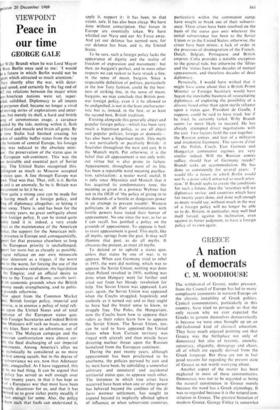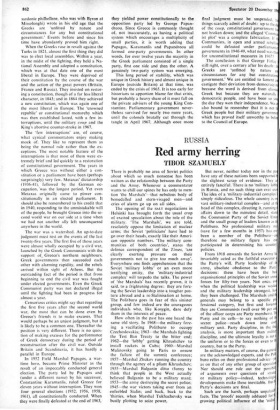GREECE
A nation of democrats
C. M. WOODHOUSE
The withdrawal of Greece, under pressure, from the Council of Europe has led to many complacent comments in western Europe on the chronic instability of Greek politics. Cynical commentators, particularly in this country, have tried to persuade us that the only reason why we ever expected the Greeks to govern themselves democratically is because we were once brought up on an old-fashioned kind of classical education. They have much enjoyed pointing out that Greece was the birthplace not only of democracy but also of tyranny, anarchy, autocracy, oligarchy, demagogy and chaos, all of which are equally derived from the Greek language. But these are not in fact good reasons for regarding the present state of Greece as not worth worrying about.
Another aspect of the matter has been neglected in most of these commentaries. Democracy was not to be regarded as being the natural constitution in Greece merely because the word has a Greek etymology. It was so regarded because it is the natural con- stitution in Greece. The greatest historian of modern Greece, George Finlay (a somewhat sardonic philhellene, who was with Byron at Missolonghi) wrote in his old age that the Greeks are 'unfitted by nature and circumstances for any but constitutional government.' Events before and since his time have abundantly proved him right.
When the Greeks rose in revolt against the Turks in 1821, almost the first thing they did was to elect local assemblies. Within a year, in the midst of the fighting, they held a Na- tional Assembly and adopted a constitution, which was at that date one of the most liberal in Europe. They were deprived of their constitution by the course of the war and the action of the great powers (Britain, France and Russia). They insisted on restor- ing a constitution, though of a far less liberal character, in 1843; and in 1864 they achieved a new constitution, which was again one of the most liberal in Europe. The 'crowned republic' or constitutional monarchy which was then established lasted, with a few in- terruptions, until the military coup and the King's abortive counter-stroke in 1967.
The 'few interruptions' are, of course, what cynical commentators enjoy making mock of. They like to represent them as being the normal rule rather than the ex- ceptions. The most notable feature of the interruptions is that most of them were ex- tremely brief and led quickly to a restoration of constitutional government. The years in which Greece was without either a con- stitution or a parliament have been (perhaps surprisingly) very few. Metaxas' dictatorship (1936-41), followed by the German oc- cupation, was the longest period. Yet even Metaxas originally came to power con- stitutionally in an elected parliament. It should also be remembered to his credit that in 1940, responding to the unmistakable will of the people, he brought Greece into the se- cond world war on our side at a time when we had not another ally left unconquered anywhere in the world.
The war was a watershed. An up-to-date judgment must rest on the events of the last twenty-five years. The first five of those years were almost wholly occupied by a civil war, launched by the Greek Communists with the support of Greece's northern neighbours. Greek governments then succeeded each other with alarming rapidity, and the rebels arrived within sight of Athens. But the outstanding fact of the period is that from beginning to end the civil war was fought under elected governments. Even the Greek Communist party was not declared illegal until the fighting had been in progress for almost a year.
Censorious critics might say that regarding the first five years after the second world war, the most that can be done even by Greece's friends is to make excuses. That would perhaps be an unjust judgment, but it is likely to be a common one. Thereafter the position is very different. There is no ques- tion of making excuses for the performance of Greek democracy during the period of reconstruction after the civil war. Outside Britain and Scandinavia, it has hardly a parallel in Europe.
In 1952 Field Marshal Papagos, a war- time hero, became Prime Minister as the result of an impeccably conducted general election. The party led by Papagos and (under a different name) by his successor, Constantine Karamanlis, ruled Greece for eleven years without interruption. They won four general elections (1952, 1956, 1958, 1961), all constitutionally conducted. When they were finally defeated at the end of 1963,
they yielded power constitutionally to the opposition party led by George Papan- dreou. Since Greece is commonly thought of, not inaccurately, as having a political system which encourages a multiplicity of small parties, it is worth adding that Papagos, Karamanlis and Papandreou all formed one-party governments. In other words, for over twelve years the majority in the Greek parliament consisted of a single party, first one side and then the other. A genuinely two-party system was emerging.
This long period of stability, which was unique in Greek history and almost unique in Europe (outside Britain) at that time, was ended by the crisis of 1965. It is too early for historians to apportion blame for that crisis, but probably a heavy share of it must fall on the private advisers of the young King Con- stantine. Parliamentary government never- theless survived for nearly two more years, until the colonels brutally cut through the tangle in April 1967. Although once more
final judgment must be suspended, I things scarcely admit of doubt: up to the d of the coup, constitutional government not broken down; and the alleged 'Comm ist plot' was a complete fabrication. If Communists, in open and armed rebelho could be defeated under parliament governments in 1946-49, what need was the for unconstitutional measures in 1967?
The conclusion is that George Finlay still right, over a century after his death: Greeks are 'unfitted by nature a circumstances for any but constitut. government.' We are entitled to lament a castigate their deviation from democracy because the word is derived from class Greek but because they are naturally democratic people, and have been so si the day they won their independence. We a also bound to remember that it is not t Greek people but their military governme which has proved itself unworthy to bel to the Council of Europe.



































 Previous page
Previous page